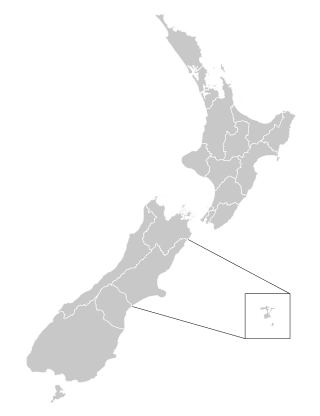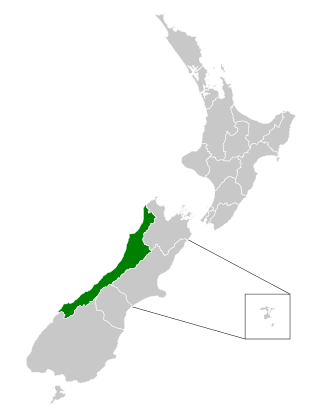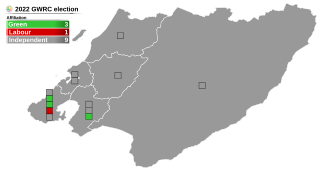
Electoral reform in New Zealand has been a political issue in the past as major changes have been made to both parliamentary and local government electoral systems. A landmark reform was the mixed-member proportional (MMP) system, implemented in 1996 following a public referendum.

Triennial elections for all 74 cities, districts, twelve regional councils and all district health boards in New Zealand were held on 9 October 2004. Most councils were elected using the first-past-the-post method, but ten were elected using the single transferable vote (STV) method. It was the first time that the STV method was available; the change came through successful lobbying by Rod Donald.

District health boards (DHBs) in New Zealand were organisations established by the New Zealand Public Health and Disability Act 2000 under the Fifth Labour Government, responsible for ensuring the provision of health and disability services to populations within a defined geographical area. They existed from 1 January 2001, when the act came into force, to 30 June 2022. Initially there were 21 DHBs, and this was reduced to 20 organisations in 2010: fifteen in the North Island and five in the South Island. DHBs received public funding from the Ministry of Health on behalf of the Crown, based on a formula that took into account the total number, gender, age, socio-economic status and ethnic mix of their population. DHBs were governed by boards, which were partially elected and partially appointed by the minister of Health.

Triennial elections for all 73 cities and districts, twelve regional councils and all district health boards (DHBs) in New Zealand were held on 13 October 2007. Most councils were elected using the first-past-the-post voting method, but eight were elected using single transferable vote.

The 2010 New Zealand local elections were triennial elections to select local government officials and district health board members. All elections are conducted by postal ballot, with election day being Saturday 9 October 2010.

The 2010 Christchurch mayoral election is part of the 2010 New Zealand local elections. On 9 October 2010, elections were held for the Mayor of Christchurch plus other local government roles. Incumbent Bob Parker was re-elected.

New Zealand has a unitary system of government in which the authority of the central government defines sub-national entities. Local government in New Zealand has only the powers conferred upon it by the New Zealand Parliament. Under the Local Government Act 2002, local authorities are responsible for enabling democratic local decision-making and promoting the social, economic, environmental, and cultural well-being of their communities, as well as more specific functions for which they have delegated authority.

The 2013 New Zealand local elections were triennial elections to elect local government officials and District Health Board members, and the membership of other local bodies such as Licensing Trusts. All elections were conducted by postal ballot, with election day being Saturday 12 October 2013.

The Mayor of Upper Hutt is the head of the municipal government of Upper Hutt, New Zealand, and presides over the Upper Hutt City Council. The mayor is directly elected using a First Past the Post electoral system. The Upper Hutt Town Board had seven chairmen, with the role regarded as the predecessor role of mayor. The Upper Hutt Borough Council was proclaimed in 1926, and with that, the role of mayor was introduced. In 1966, Upper Hutt became a city council. The current mayor, Wayne Guppy, is the eleventh since the role was created in 1926, and he was first elected in 2001.
The 2013 Wellington City mayoral election is part of the New Zealand local elections. On 12 October 2013, elections were held for the Mayor of Wellington plus other local government roles. Wade-Brown was re-elected.

The 2016 New Zealand local elections were triennial local elections to select local government officials and District Health Board members. Under section 10 of the Local Electoral Act 2001, a "general election of members of every local authority or community board must be held on the second Saturday in October in every third year" from the date the Act came into effect in 2001, meaning 8 October 2016.

Auckland District Health Board (ADHB) was a district health board that provided healthcare in the Auckland Region in New Zealand, mainly on the Auckland isthmus. This district health board existed between 2001 and 2022 and was governed by a part-elected, part-appointed board. In 2022, its functions and responsibilities were subsumed by Te Whatu Ora and Te Aka Whai Ora.
The 2013 Rangitikei local elections were held across the Rangitikei District of Manawatū-Whanganui, New Zealand, for the offices of Mayor of Rangitikei and eleven members of the Rangitikei District Council on 12 October 2013. They were held as part of the 2013 New Zealand local elections. Postal ballots were issued to 9,866 registered voters, and were returned from 23 September to 12 October. Across the district, 4,856 people cast votes, a voter turnout of 49.22%. Some voters chose not to vote in particular elections or referendums, so voter turnout in individual elections varies from this figure.
The 2016 Rangitikei local elections were held across the Rangitikei District of Manawatū-Whanganui, New Zealand, between 16 September and 8 October. These elections were for the offices of Mayor of Rangitikei, eleven members of the Rangitikei District Council, four members each of two community boards, two members of the Horizons Regional Council and seven members of the Whanganui District Health Board; these elections were part of the New Zealand-wide local elections. Postal ballots will be issued to all registered voters.

The Canterbury District Health Board was a district health board with the focus on providing healthcare to the Canterbury region of New Zealand, north of the Rangitata River. It was responsible for roughly 579,000 residents, or 12% of New Zealand's population. The Canterbury District Health Board covered a territory of 26,881 square kilometers and was divided between six territorial local authorities. In July 2022, the Canterbury DHB was merged into the national health service Te Whatu Ora.

The Tairāwhiti District Health Board, branded as Hauora Tairāwhiti since 2015, was a district health board with the focus on providing healthcare to the Gisborne District of New Zealand. In July 2022, the Tairāwhiti DHB was merged into the national health service Te Whatu Ora.

The Wairarapa District Health Board was a district health board that provided healthcare to the Masterton, Carterton, and South Wairarapa districts of New Zealand. In July 2022, the Wairarapa DHB was merged into the national health service Te Whatu Ora.

The West Coast District Health Board was a district health board with the focus on providing healthcare to the West Coast region of New Zealand. In July 2022, the West Coast DHB's functions and responsibilities were taken over by the national health service Te Whatu Ora.

The 2022 Wellington Region local elections were held on 8 October 2022 as part of the wider 2022 New Zealand local elections to elect members to sub-national councils and boards. These elections covered one regional council, eight territorial authorities, and various community boards and licensing trusts.










